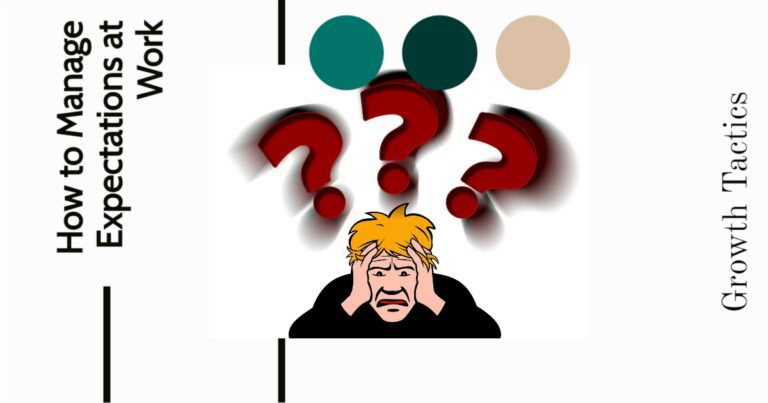You’ve been at your new job for a few weeks, and you’re feeling pretty good about things. Your coworkers are friendly, your boss is supportive, and there’s no drama, yet. Or maybe it’s been a few months or even years since you started at this company. But now that you’re in the thick of things (and feeling more confident about the work), you can start to see some issues arise.
Maybe someone else’s performance is affecting yours. Perhaps there are unrealistic expectations from higher-ups. Or maybe people just don’t communicate well enough with each other. Whatever the case may be, managing expectations at work will help resolve these issues quickly. So everyone can focus on getting their work done efficiently and effectively.
Jump To Section
Why Expectation Management Is Important
Expectation management is important because when you manage your expectations, you’re better able to learn from and cope with the realities of work. You’ll also be less likely to feel disappointed or disengaged. This can help you develop a more positive attitude toward work. Which has been shown to improve productivity and creativity at work.
How to Manage Expectations at Work

When you’re working with a team, it’s important to establish clear expectations with your colleagues. You should also hold yourself accountable and make sure that you are not promising what you can’t deliver.
Here are some tips for setting the right tone when it comes to managing expectations at work:
Establish your goals.
- Define what you want to accomplish at work.
- Set priorities for each goal and make a plan for reaching them.
- Focus on the things you can control, such as how well you manage your time and resources, rather than worrying about external factors that are out of your hands.
Be realistic about what you can accomplish in a certain amount of time or budget allocation, or by a certain deadline, and write down all of those expectations so there’s no confusion!
Be flexible, and if you can’t accomplish your goals, adjust them so that you can.
Set aside time to review your goals and progress toward them. Schedule regular reviews so that you can make adjustments as necessary to stay on track.
See Related: The Importance of Self-Awareness as a Leader
Don’t Promise What You Can’t Deliver
There are times when it’s easier to say yes than it is to say no. You want your boss to take you seriously, so you agree to take on a project that’ll take up a lot of your time. You don’t want your coworker to get angry, so you agree on an unrealistic deadline. You want the customer or client happy with their experience, so you promise them more than what’s possible in order not to disappoint them.
This can be avoided by setting realistic expectations for yourself and others.
Hold Yourself and Others Accountable
To manage expectations, you must first be realistic about your role and responsibilities. Set goals for yourself and others that are achievable. Once these goals have been established, hold yourself (and others) accountable by holding regular weekly meetings to discuss progress.
During each meeting, ask yourself whether the expectations were met or not. If not, re-evaluate what went wrong and decide how you will adjust accordingly for next week. The same goes for everyone else involved. Hold them accountable by checking in regularly to see if they’re on track with their responsibilities so that nothing falls through the cracks!
See Related: 9 Tips to Deal With a Toxic Work Environment and Be Happier
Align Expectations With Abilities or Skills
This is the most important step in managing expectations. You need to know what you are good at, what you’re not good at, and what you want to learn or develop. It’s also important to acknowledge your limitations. So that people can accurately predict how you will perform on any given task or project.
If someone asks for something that isn’t within your areas of expertise, it’s better to say so than just agree. Or even worse, because they asked with urgency in their voice!
Set the Right Tone With Your Boss and Colleagues

- Set the right tone with your boss and colleagues.
- Be clear about what you can do and what you can’t.
- Be clear about what is expected of you, who will be responsible for it, and when it will be delivered.
You are not the only one who needs to set expectations. Your boss should also set them with other team members as well as with clients, customers, vendors and partners.
Make sure everyone’s expectations are aligned at every level of the organization so that there aren’t any surprises along the way that could derail a project or put undue pressure on people involved in getting things done within their own departments or teams
Be Realistic About What You Can Accomplish Within a Set Time Frame or Budget
One of the biggest contributors to how well you manage expectations is how realistic you are about what you can accomplish within a set time frame or budget.
For example, if your boss asks for a report on an important project by Friday, it’s best to be realistic about what can be done in that amount of time. If the task is too large and will take longer than expected, ask for more time so others aren’t disappointed with the results.
On the other hand, if your goal seems unattainable due to limited resources or other factors outside of your control (e.g., being understaffed), then don’t over-promise and under-deliver because this will only cause problems further down the line.
Communicate Clearly and Often

When you communicate, make sure to keep the following in mind:
- Be clear about what you need from others. If a colleague asks for your feedback on an idea, be honest and direct about how it can be improved. Don’t sugarcoat anything. It just makes things worse down the line when they realize that their work isn’t up to scratch.
- Communicate regularly with your boss and colleagues so that everyone is on the same page about what needs to get done and how things are going at any given time. Even if it feels like there is nothing new happening or that nothing needs to be discussed, talk anyway! It helps build trust when people know they can reach out without feeling like they have no choice but to wait until the next weekly meeting before speaking up again.
- Communicate frequently with your team members so they know where they stand within their department or division of work (and vice versa). You might think it’s unnecessary because everyone knows who does what already… but even those who work closely together need reminders of their goals periodically because projects move fast and sometimes we forget why we’re doing something until we take a step back for some perspective again later on down that road ahead.
See Related: How To Empower Others To Do Great Things
Quantify Outputs, Not Just Effort
Don’t just measure the “effort” you want to see from your team. You need to measure the results they deliver and identify ways to track them over time. If you ask people what they did at work last week, then you can quantify the amount of work done by each person. However, it won’t reflect how much value that person contributed or whether a project was successful.
Reinforce Expectations
An important step in managing expectations is to make sure they’re reinforced. By reinforcing the expectations you’ve set, you can help your team members understand what’s expected of them. You can go about this in a number of ways:
- Make sure that everyone on your team understands their role and the purpose behind it.
- Help them identify if any exceptions or extenuating circumstances might affect their work, so they know what to expect as well as how to handle those situations.
- Let them know when they’ve done a good job on something (and why).
Avoid Assumptions

Don’t assume people know what you’re thinking. For example, if you think that a coworker is going to be late for the team meeting and forget about it, don’t assume he or she will bring it up.
Instead, bring it up yourself! Ask questions like “Do we have enough time for everyone to get here?” or “Are there any other items on the agenda that need attention before we start?” These questions are open-ended and invite more conversation than closed-ended ones like “Can everyone make this meeting?”, which can lead people to feel pressured into showing up no matter where they are or how much time it’ll take them.
Don’t assume everyone wants what you do. It’s easy to assume that every employee has the same goals as their boss but often times this isn’t true!
Employees may have completely different ideas about what success looks like at work (or even in life) than their managers do. Some might value autonomy above all else while others seek guidance from their superiors at every turn.
Still, others might be striving towards something different altogether (like building a side hustle). By encouraging employees to share their own personal goals with each other and understanding each person’s unique motivations, both managers and workers can better collaborate together towards mutual success. Which means less workplace friction overall!
Remember, You Have the Authority to Say No

As a leader, you don’t have to be a yes man or woman. If someone is asking for something that’s unreasonable, whether it’s time or resources, you can and should decline their request.
However, this doesn’t mean that you should automatically decline every single thing your team members ask for. Rather, it means that when appropriate and as necessary, you need to be able to say no.
For example, if one of your employees asks for extra money from the budget because they feel guilty about using some of their vacation days this year so far and they know full well there are other employees on vacation who haven’t used any yet it would be perfectly reasonable to say no! It doesn’t mean they’re rude people. In fact, what it means is that they understand how important budgets are at work and recognize how hard everyone works throughout the year.
See Related: How to Improve Your Work-Life Balance to Live a Happier, More Fulfilling Life
When It Comes to Managing Expectations at Work, Communication Is Everything
The biggest mistake you can make when managing expectations at work is to assume that your colleagues know what you’re thinking. It’s also a mistake not to communicate your goals and expectations clearly, especially if they are vague or open-ended.
A good rule of thumb is to ensure that all parties involved understand the “what” and “why” as well as the “how”. For example, if you expect something from your intern, let them know what it is. Don’t just say “I need this report by Friday.” Rather, explain why their work matters: “This report will show our team how we can improve marketing efforts in rural communities.”
Be sure everyone involved understands their role in achieving the outcome. For example, who provides what support? Who does what part of the project? And so on.
Mastering the Art of Managing Employee Expectations
Navigating the journey of managing employee expectations is a cornerstone of effective leadership. When you set clear expectations, it lays the groundwork for mutual respect and productivity within your team. Here’s a blueprint to help you steer this critical aspect:
Be Transparent
Let’s start with the basics: transparency. To cultivate an atmosphere of trust, be open about what the business needs and what you expect from your team members. Think of it as charting a course before embarking on a mission. Transparency minimizes miscommunication and aligns everyone towards a shared objective.
Define Roles Clearly
Every individual must understand their specific role and how it contributes to the overarching mission. This clarity not only prevents overlaps and confusion but also fosters a sense of ownership and purpose in each team member. Remember, in any strategic operation, each role, no matter how small, plays a vital part in achieving success.
Regular Check-ins
Establish a routine for regular check-ins. These aren’t just for monitoring progress but also for offering support and adjustments as needed. Use this time to listen—really listen—to your employees. Often, the smallest feedback can highlight miscommunications or unmet needs before they escalate into bigger issues.
Set Achievable Goals
Goals should challenge your team, but they must also be realistic and attainable. Setting the bar too high can lead to frustration and disappointment. Instead, aim for a balanced approach that encourages growth while being mindful of current capabilities and resources.
Empower and Encourage
Empower your employees to take initiative and make decisions within their roles. This not only boosts their confidence but also fosters a culture of accountability and innovation. Encourage them to find their own solutions and remind them how their contributions align with the team’s bigger purpose.
Provide Constructive Feedback
When it comes to feedback, aim to be supportive yet straightforward. Highlight what’s working well, and address areas that need improvement with practical advice. Approach this as a mentor guiding a mentee, focusing on growth and learning rather than criticism.
Incorporating these principles into your leadership style will not only help in managing expectations effectively but also in building a resilient and cohesive team. Remember, the strength of your leadership is reflected in the growth and well-being of your team. Lead with empathy, clarity, and a steadfast commitment to purpose-driven action.
Your team is your greatest asset. Prioritize their unique approaches, guide them with purpose, and watch as you collectively achieve unparalleled success.
Conclusion
Now that we’ve covered some of the basics, it’s time to get started. Use these tips as a starting point for managing expectations in your workplace. Remember that communicating clearly and often is key, so take some time to think about how you can improve your own communication skills before taking on new projects or responsibilities at work.
Did you find this article useful? Don’t forget to share and subscribe below.

